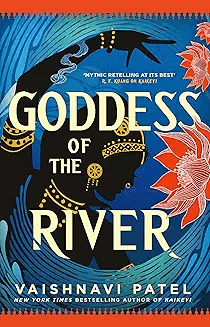
For all things fantasy, horror, and speculative fiction

Review Details
Review type: Book
Title: Goddess of the River
Author: Vaishnavi Patel
Publisher: Orbit

Reviewed by: Catherine Berridge
Other details: Orbit, £9.99
Goddess of the River by Vaishnavi Patel
Book Review
Catherine Berridge
This lyrical novel by Vaishnavi Patel begins with a fall from grace. The Goddess Ganga is outcast by Shiva and condemned to life as the River Goddess with only her Vasus, her Godlings, for immortal company. Unfortunately, they, too, are soon cursed by a human Holy man, and the River Goddess Ganga takes mortal form so that she might bear her Vasus as mortal children. The rest of the novel is an account of the relationship between Ganga, the River Goddess, and her son Devavrata, a Vasus forced into the life of a human.
Goddess of the River is a retelling of one of the stories of the great Sanskrit epics of ancient India, the Mahabharata. The Mahabharata is one of two of the great texts of Hinduism, the other being the Ramayana, and speaks of the events and aftermath of the Kurukshetra War, a war of succession between the Kauravas and the Pandavas. This is the second novel by Vaishnavi Patel, the first being the tale of the Queen Kaikeyi of the Ramayana.
Although I found this novel slow to begin with, where it dealt only with the events of the life of Ganga, as soon as the Pandavas and their court were introduced, I found myself much more involved with the characters and their fate. There is, in particular, some lovely writing as the relationship between Ganga and her son Devavrata is developed. This includes the Goddess spending time playing in the ocean with Devavrata when he is still a child. I could quite clearly see the sun-kissed ocean stretching out before them. I was also drawn to the character Bhishma, the grown version of Devavrata, who comes across as a man of integrity with the weight of the world on his shoulders, and I found the scenes involving him most moving of all.
The themes approached in this novel are war and the tragedy of war, the bond between mother and son, and the question of the nature of ethical conduct. The story challenges us to answer the question, “What in life is truly good?†An Ancient Indian might have been tempted to say that the keeping of oaths and obedience to duty are defining features of an ethical life – but this is something that is challenged here in Goddess of the River and the Mahabharata. It is Bhishma’s rigid adherence to oath and duty that leads to the disaster of the world-destroying war. However, it is never made entirely clear what the answer to the ethical question is if it is not duty. However, Vaishnavi Patel does a good job of explaining why a man of this era would behave as Bishma does.
This novel is an excellent retelling of part of the Mahabharata, with moments of innocent joy contrasting sharply with the horror of war. It is also refreshing to read a story that draws on material that comes from outside the traditional Western canon. I would therefore recommend this novel to anyone interested in philosophical questions about the nature of goodness, to anyone interested in world literature or to anyone who is interested in a well-told story.
Tags: Book ReviewFantasyOrbitSanskrit RetellingVaishnavi Patel
Category: Book Review
All reviews
Latest Reviews:
- Januaries by Olivie Blake
- Basic Roleplaying: Creatures
- Five Mini-Adventures – PDF (Shadowdark RPG)
- Cursed Scroll Zine, Vol. 1: Diablerie! RPG Zine
- Empire of the Dawn by Jay Kristoff
- The God and the Gumiho by Sophie Kim
- Citadel of the Moon by Mike Chinn
- Hemlock and Silver by T. Kingfisher
- Thirsty by Lucy Lehane
- Solodark RPG
Review tags:
Action (49) Adventure (70) Contemporary Fantasy (18) Fantasy (120) Gothic Horror (12) Harper Voyager (12) Historical Fantasy (14) Hodderscape (12) Horror (76) Orbit Books (33) Romance (28) Romantasy (13) Science Fiction (35) Titan Books (36) TorDotCom (12)
Leave a Reply